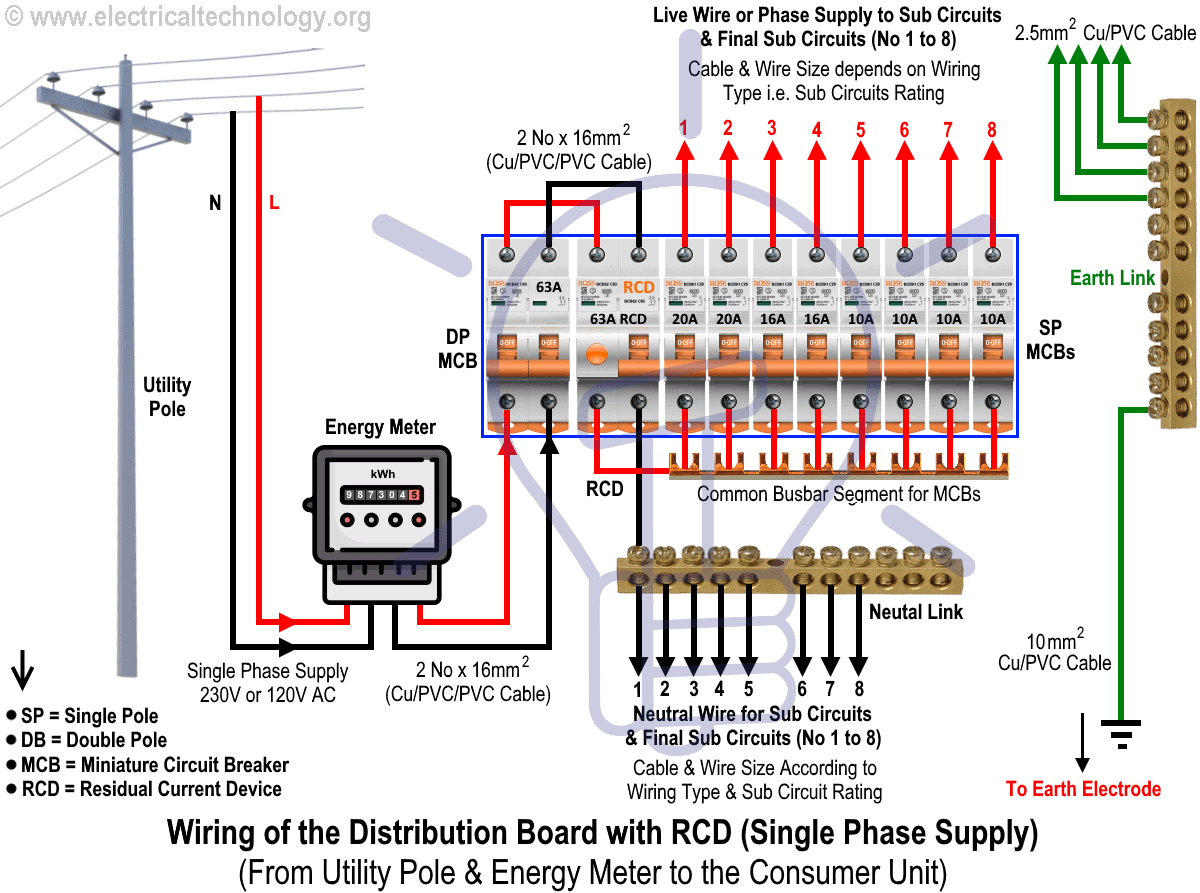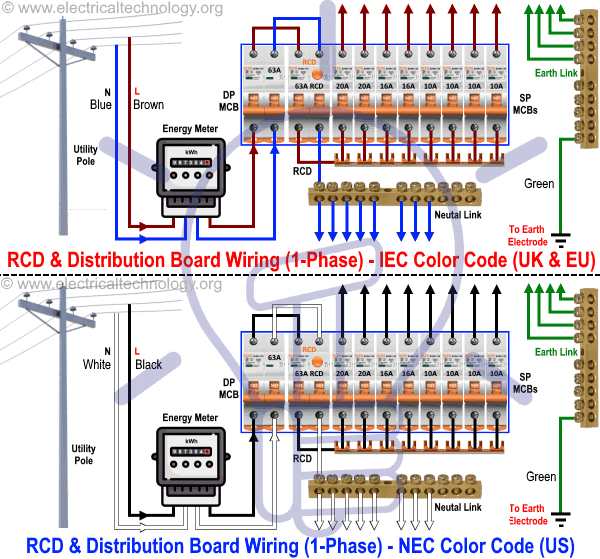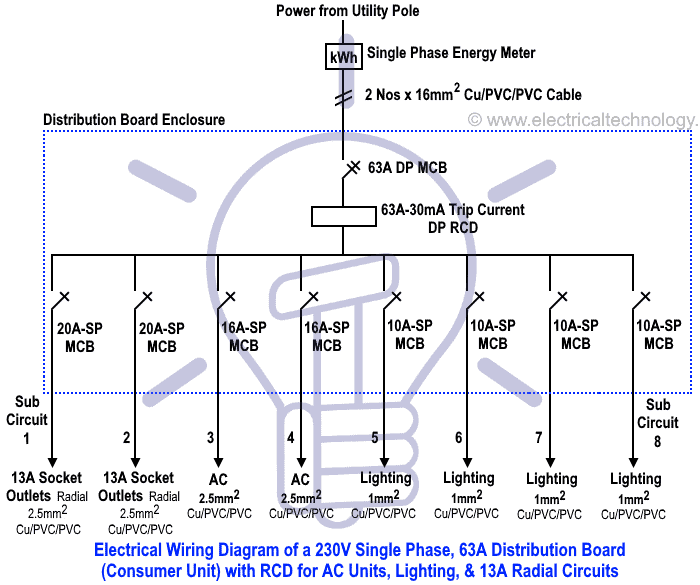Electrical Wiring Installation of the Distribution Board with RCD (Single Phase Home Supply from Utility Pole & Energy Meter to the Consumer Unit)
What is Distribution Board?
Distribution board is a safe system designed for house or building that included protective devices, isolator switches, circuit breaker and fuses to connect safely the cables and wires to the sub circuits and final sub circuits including their associated Live (Phase) Neutral and Earth conductors. Distribution board is also known as “Fuse Board“, “Panel Board” or “Consumer Unit“. following are the types of Distribution boards.
- Related Wiring Tutorial: Wiring of the Distribution Board (Single Phase Supply From Utility Pole & Energy Meter to the Consumer Unit)
Types of Distribution Boards
- Main Distribution Board (MDB)
- Sub Distribution Board (SDB)
- Final Distribution Board (FDB)
MDB = Main Distribution Board
A distribution board unit installed in the buildings which firstly receive the incoming single phase electric supply (AC low voltage (LV) (230V AC or 120V AC in US) from transformer secondary through electric pole and energy meter or the distribution company’s electric service provider outlets is known as Main Distribution Board.
Main Distribution Board (MDB) is also known as Fuse board or consumer unit where the main protective and isolation devices are installed to provide electricity in a safe range to the connected electrical appliances.
Related Wiring Tutorials:
- Different Types of Wiring Systems and Methods of Electrical Wiring
- How To Wire Switches in Parallel?
SDB = Sub Distribution Board
The Distribution Board which is used to distribute electrical wiring and circuits within a selected area in a building or house, i.e. floor in a multi storey building. The Sub distribution board is connected and supplied from the Main Distribution Board through different wires and cables rated according to the load requirement.
FDB = Final Distribution Board
The Distribution Board which provide electric supply to the Final and Sub Final Circuits is known as Final Distribution Board. FDB (Final Distribution Board) directly connected through SDB (Sub Distribution Board) and the final switches are used to control the connected electrical devices and appliances such as light, air-conditioner, fan etc.
Wiring Accessories for Single Phase Distribution Board
Main Distribution Board or Fuse Boards (Consumer Unit) usually contains on the following three main units to control and distribute electric supply to the different connected appliances and devices through electrical wiring cables and wires.
- DP = Double Pole MCB (The main isolator or main switch).
- RCD (Also DP) Residual Current Devices for safety.
- SP = Single Pole MCB (Circuit Breakers and Fuses).
- MCB & CB = Miniature Circuit Breaker and Circuit Breaker.
The above mentioned electrical wiring accessories and protective devices are used to control and distribute electric supply (safely to connected electrical appliances) around your home. The following diagram is showing single phase home electric supply and wiring of distribution board with RCD.
Related Electrical Wiring Guide: How To Wire a 3-Phase kWh Energy meter?
How to Wire RCD (Residual Current Device) ?
In this Single Phase home supply wiring diagram, the main supply (Single Phase Live (Red Wire) and Neutral (Black Wire) comes from the secondary of the transformer (3 Phase 4 Wire (Star) System) to the single phase energy meter (Note that Single Phase supply is 230V AC and 120V AC in US). These two lines (Line and Neutral) from energy meter are connected to the Double Pole MCB isolator switch. They Live Wire is connected to the RCD and then to the common busbar segment of Single Pole MCBs. The outgoing lines from MCBS (SP) are connected to the final circuits and sub final circuit and electrical devices like fan, lights, switches etc.
The Neutral are connected through Energy meter, MCB (DP), RCD and then to the Neutral Link. All the sub circuits, sub circuits can be connected to the Neutral Link. Keep in mind all the electrical devices and appliances should be connected to the Earth Link for safety which is directly connected to the earth electrode and earth plate for proper earthing and grounding.
In the following single phase electrical wiring for home supply, We used 63A MCB (DP), 63A RCD (DP) and different rating if MCBs (SP) such as 20A, 16A, 10A etc according to your need.
Details of each sections are given below the fig.
Click Image to enlarge

Wiring Color Code:
We have used Red for Live or Phase , Black for Neutral and Green for Earth Wire. You may use the specific area codes i.e. IEC – International Electrotechnical Commission (UK, EU etc) or NEC (National Electrical Code [US & Canada] where;
NEC:
Single Phase 120V AC:
Black = Phase or Line, White = Neutral and Green/Yellow = Earth Conductor
Three Phase 208 AC:
Black = Phase 1 or Line1, Red= Line 2, Blue= Line 3, White / Gray = Neutral and Green/Yellow = Earth Conductor
IEC:
Single Phase 230V AC:
Brown= Phase or Line, Blue= Neutral and Green = Earth Conductor
Three Phase 208 AC:
Grey= Phase 1 or Line1, Black= Line 2, Brown= Line 3, Blue = Neutral and Green= Earth Conductor
Below is the given wiring diagram of Single Phase Distribution Board with RCD in both NEC and IEC electrical wiring color codes. The same description and detailes can be used as mentioned for the above fig 1.

Double Pole MCB (DP) = The Isolator or Main Switch)
This is the main operating switch which is used to control the electric power supply in the building(s). The main switch can be used to immediately turn ON or OFF the main electric supply to the connected appliances in case of emergency like short circuits, electric shock, fire, or while working on the main board, sub circuit or final sub circuits to troubleshoot and for maintenance purposes. Multiple or separate mains switch board or fuse board may be used if more supply unites are installed in the system i.e. storage heater etc.
RCD (DP) = Residual Current Devices for Safety
A (RCD) Residual-Current Device, or (RCCB) Residual-Current Circuit Breaker, is an electrical wiring device or switch that disconnects or trip a circuit whenever it detects that the electric current is not balanced between the energized conductor (L) and the return neutral conductor (N). And then instantly disconnect the electricity flow in the connected circuits by operating in the safe mode automatically to avoid electric hazards.
- Related Wiring Tutorial: Staircase Wiring Circuit Diagram – How to Control a Lamp from 2 Places by 2-Way Switches?
CB (SP) = Single Pole Circuit Breakers
Circuit Breaker is a device like a fuse which makes and breaks the circuit. In other words, Circuit Breaker is a device which switch ON and OFF electric supply at normal and abnormal condition respectively. These are automatic protection devices in the Main Switch Board or Fuse-Box that switch off a circuit if they detect a fault. Circuit Breaker may be Single Pole (SP), DP-Double Pole (DP) and Triple Pole (TP). The size of the fuse and Circuit Breaker are similar to use, but Circuit Breaker is more safe to use as compared to fuses due to automatic operation as you can reset it again if it trips ever.

You may also check the related Electrical Wiring Installation Tutorials given below.
- How to Wire a GFCI Circuit Breaker? 1, 2, 3 & 4 Poles GFCIs Wiring
- How to Wire GFCI Combo Switch and Outlet – GFCI Switch/Outlet Wiring Diagrams
- How to wire a GFCI Outlet? – GFCI Wiring Circuit Diagrams
- Single-Phase Electrical Wiring installation in a Multi-Story Building
- Three-Phase Electrical Wiring installation in a Multi-Story Building
- Three Phase Electrical Wiring Installation in Home
- Basic Homr Electrical Wiring Installation Diagrams & Tutorials
 Why is the Neutral Prong or Slot Wider on a Plug or Outlet?
Why is the Neutral Prong or Slot Wider on a Plug or Outlet? Why are there Grooved Slots in the Pins of Two Pin Plugs?
Why are there Grooved Slots in the Pins of Two Pin Plugs? How to Size a Branch Circuit Conductors with Protection?
How to Size a Branch Circuit Conductors with Protection? How to Size Feeder Conductors with Overcurrent Protection
How to Size Feeder Conductors with Overcurrent Protection How to Size Service-Entrance Conductors and Feeder Cables?
How to Size Service-Entrance Conductors and Feeder Cables? How to Size Equipment Grounding Conductor (EGC)?
How to Size Equipment Grounding Conductor (EGC)?